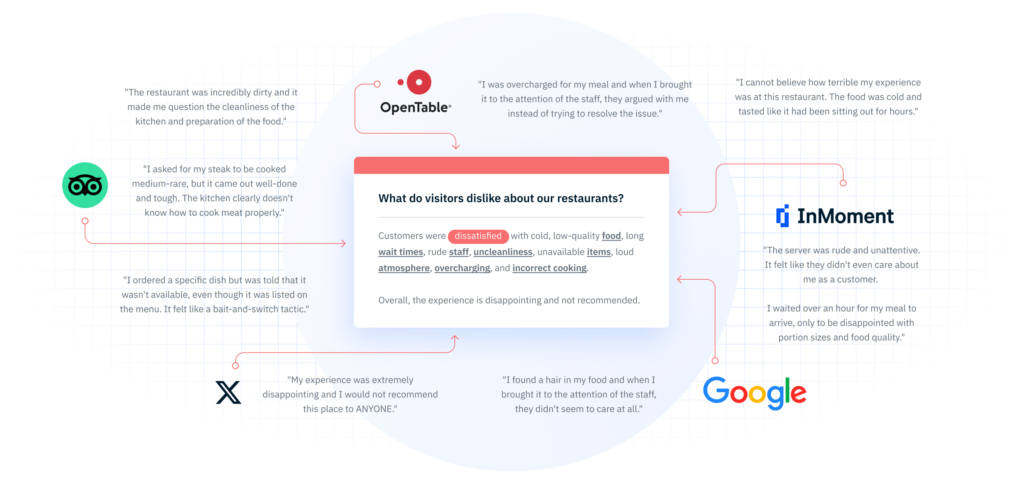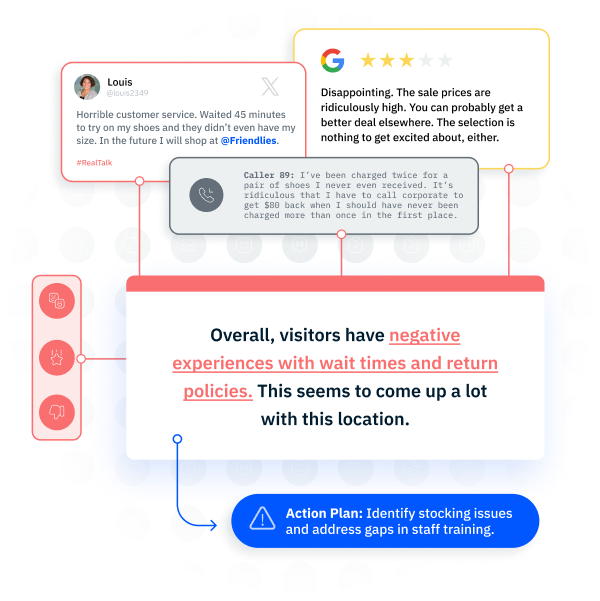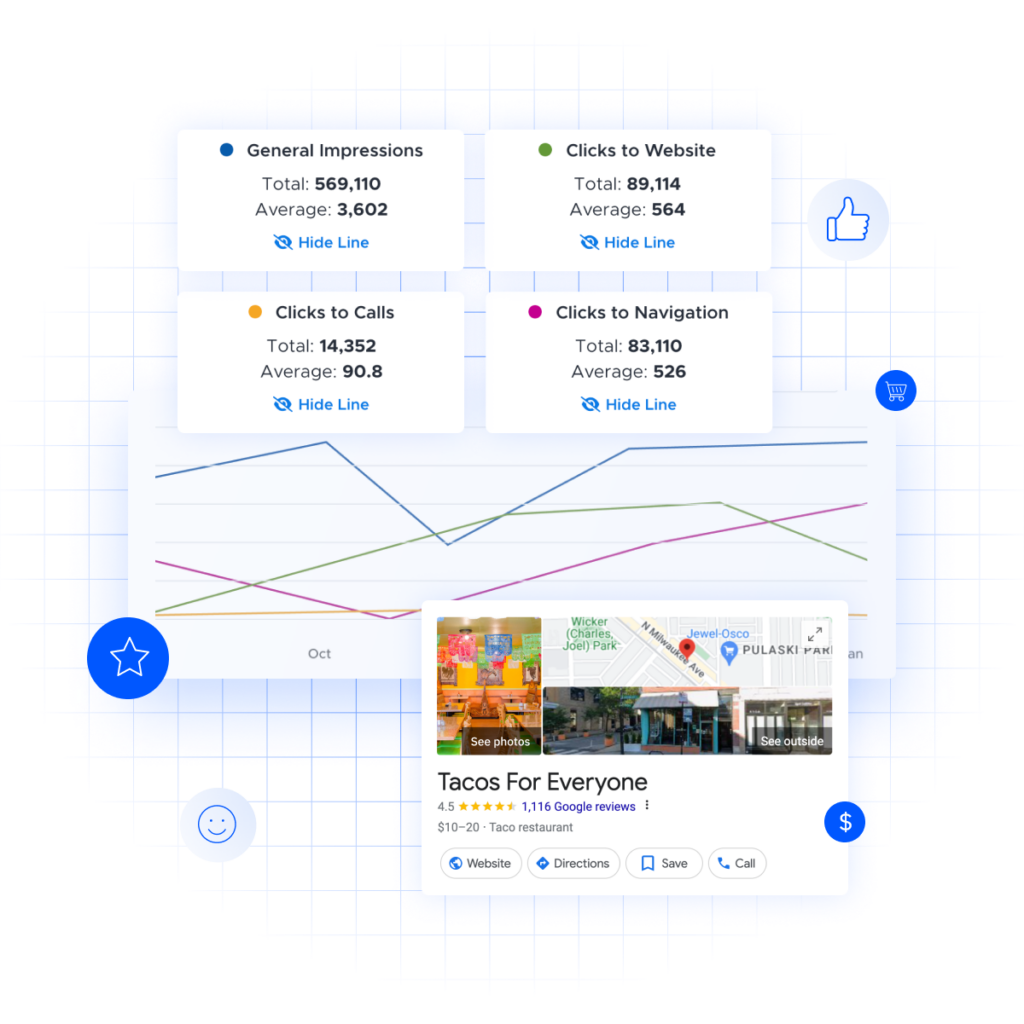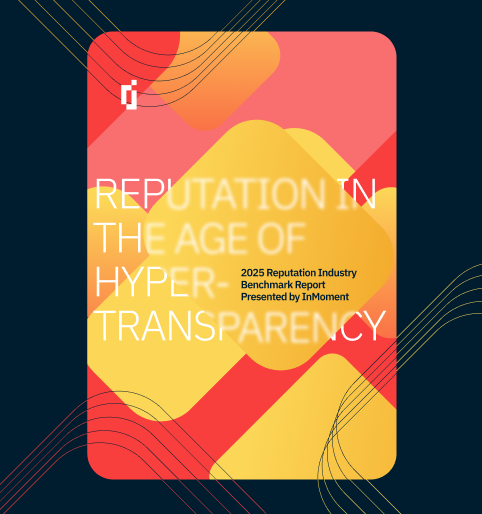Your Guide to Mastering Brand Reputation Management
Brand reputation management is essential for businesses to maintain a positive public image and build trust with their customers. By actively monitoring and addressing public perceptions, companies can mitigate negative feedback, foster customer loyalty, and enhance their overall market presence.
Your company’s reputation is arguably more important than your product or service. That’s why maintaining a positive brand reputation is crucial for business success. Consumers today rely heavily on online information and reviews, making brand reputation management a top priority. In this comprehensive guide, we will delve into the intricacies of brand reputation management, exploring strategies, key components, pitfalls to avoid, and the role of online and employee reputation management.
What is Brand Reputation Management?
Brand reputation management is the proactive effort to shape and control the public’s perception of a brand. It involves monitoring, influencing, and maintaining the overall sentiment surrounding a business to ensure a positive image.
How to Create a Brand Reputation Strategy
Creating a brand reputation strategy may seem daunting at first. But it may be easier than you might think. Creating a business reputation management strategy starts with defining who you are as a business, and then making sure you are acting in accordance with that.
1. Define Your Brand Identity:
Establish a clear and consistent brand identity that aligns with your values and resonates with your target audience. Doing this allows you to cultivate a strong and recognizable presence in the market. When your brand identity is cohesive and mirrors the values that matter most to your business, it becomes a powerful tool for connecting with consumers on a deeper level.
2. Monitor Online Presence:
Use tools to monitor mentions of your brand across various online platforms. Google Alerts, social media monitoring tools, and specialized software can help you stay informed. These tools are essential for understanding how your customers are talking about your brand.

3. Engage with Your Audience:
Build strong relationships with your audience through active engagement. Respond to customer feedback, both positive and negative, to show transparency and dedication to customer satisfaction. Doing this will help you foster a community around your brand, where customers feel heard, valued, and connected.
4. Establish Brand Guidelines:
Define clear guidelines for how your brand should be represented across different channels. Establishing brand guidelines is a pivotal step in creating a cohesive and recognizable brand identity. These guidelines serve as a roadmap for how your brand is visually and verbally presented across various channels. Consistency builds trust and recognition.
5. Employee Training:
Train employees to be brand ambassadors. Ensure they understand the brand values and guidelines, especially those who interact with customers directly.
6. Measure Your Success:
Crafting an effective brand reputation strategy is not a one-time endeavor; it’s an ongoing process that requires continuous evaluation and adaptation. Tracking results and measuring the impact of your strategies are essential components of ensuring your brand reputation management efforts align with your business objectives.
In order to do that, you need to adopt an integrated CX approach to brand reputation management that makes data from multiple sources easily digestible in user-friendly reports.
What are the Key Components of Brand Reputation Management?
Brand reputation management is a multifaceted discipline that involves strategic planning, continuous monitoring, and proactive engagement. Understanding the key components is essential for developing a comprehensive approach to safeguarding and enhancing your brand’s image. Let’s delve into the core elements that constitute effective brand reputation management.
1. Trust Building
Trust is the cornerstone of a positive brand reputation. Establishing and nurturing trust requires consistent delivery on promises, transparency in communication, and a commitment to ethical business practices. Building trust is a continuous process that involves every interaction your brand has with its audience.
2. Customer Satisfaction
The satisfaction of your customers directly influences your brand’s reputation. Providing high-quality products or services, responsive customer support, and personalized experiences contribute to positive reviews and recommendations. Happy customers become brand advocates, amplifying positive sentiments.
3. Online Presence and Perception
Your online presence significantly shapes your brand’s perception. Monitoring and managing online reviews, social media mentions, and search engine results are critical. Strategic online reputation management ensures that your brand is portrayed positively across various online platforms.
4. Employee Engagement
Your employees are integral to your brand’s reputation. A positive internal culture translates into positive external perceptions. Investing in employee training, recognizing achievements, and fostering a workplace that aligns with your brand values contributes to a harmonious and authentic brand representation.
5. Crisis Management
No brand is immune to challenges, and how you navigate crises profoundly impacts your reputation. Developing a robust crisis management plan that includes timely communication, genuine apologies, and proactive solutions is essential for mitigating the potential damage to your brand.

What to Avoid with Brand and Business Reputation Management
While there are proactive steps to take for a positive image, it’s equally important to be aware of potential pitfalls that could tarnish your reputation. Here are key aspects to avoid when navigating the realm of brand and business reputation management:
1. Ignoring Customer Feedback
One of the most common mistakes is neglecting customer feedback, both positive and negative. Ignoring customer comments, reviews, or complaints can create the impression that your brand is indifferent to customer concerns. Actively engage with your audience, address issues promptly, and demonstrate a commitment to customer satisfaction.
2. Reacting Emotionally to Criticism
Criticism, whether justified or not, is inevitable. Reacting emotionally or defensively to negative feedback can escalate the situation and harm your reputation further. Instead, approach criticism with a calm and constructive mindset. Acknowledge concerns, address them professionally, and seek solutions.
3. Lack of Social Responsibility
In today’s socially conscious environment, consumers appreciate brands that contribute positively to society. Avoid the perception of being solely profit-driven by actively engaging in social responsibility initiatives. Showcase your commitment to ethical practices, sustainability, and community involvement.
Reputation Management Software
Managing your brand and business reputation requires more than just vigilance; it demands strategic precision and technological assistance. That’s where reputation management software comes into the picture. Reputation management software should be a part of your brand reputation strategy, but it is also an important factor in ensuring your success with online brand reputation management. Here is a brief overview on what it is, and how it can help your business.
What is Reputation Management Software?
Reputation management software is a specialized set of tools and applications designed to help businesses proactively monitor, analyze, and influence their online reputation management. These platforms aggregate data from various online sources, including social media, review sites, news articles, and other digital channels, providing comprehensive insights into how a brand is perceived.
Key Features and Functions

1. Sentiment Analysis
Reputation management software employs advanced sentiment analysis algorithms to assess the tone of online mentions related to your brand. This feature helps you understand the overall sentiment—positive, negative, or neutral—surrounding your business.
2. Review Monitoring
Online review management is crucial to efficiently keep track of customer feedback across multiple platforms. From popular review sites to social media, reputation management software consolidates reviews, allowing you to respond promptly to customer feedback and address concerns before they escalate.
3. Competitor Analysis
Many reputation management tools offer features that enable you to monitor the online reputation of your competitors. Analyzing competitor strategies and market perceptions provides valuable insights for refining your own brand positioning.
4. Customizable Alerts
Receive real-time alerts when your brand is mentioned online. Customizable notification settings ensure that you stay informed about both positive and negative mentions, allowing for swift responses and proactive reputation management.
5. Data Visualization and Reporting
These tools often provide intuitive dashboards and reports that present key performance indicators, sentiment trends, and other crucial metrics. Data visualization simplifies the interpretation of complex information, facilitating informed decision-making.
How Reputation Management Software Helps Your Brand
1. Proactive Issue Resolution
By monitoring online mentions in real-time, reputation management software allows you to address potential issues swiftly. Proactive issue resolution can prevent negative sentiments from escalating and protect your brand from reputational harm.
2. Strategic Decision-Making
Data-driven insights provided by these tools empower businesses to make strategic decisions. Whether refining marketing strategies, responding to customer trends, or adapting to market shifts, reputation management software supports informed decision-making.
3. Time-Efficiency
Monitoring your brand manually across various online channels can be time-consuming. Reputation management software streamlines this process, providing a centralized platform for monitoring, analysis, and response, saving valuable time for your team.
4. Enhanced Customer Engagement
Responding promptly to customer feedback, whether positive or negative, demonstrates attentiveness and dedication to customer satisfaction. Reputation management software facilitates streamlined engagement, fostering stronger connections with your audience.
5. Competitive Advantage
By staying ahead of industry trends and monitoring competitor activities, reputation management software provides a competitive advantage. This foresight allows you to position your brand effectively and capitalize on emerging opportunities.
Reputation management software is a strategic ally for businesses seeking to maintain and enhance their brand and business reputation. Investing in these tools not only streamlines the monitoring process but also equips your business with the insights needed to navigate the complex landscape of online perception effectively. By leveraging the power of reputation management software, you can stay ahead of the curve, mitigate potential risks, and ensure a positive and influential brand presence.
Online Reputation Management
It is hard to discuss business reputation management without discussing online reputation management. Understanding and controlling your online reputation has never been more important than it is today.
Online reputation management is the practice of actively monitoring and influencing the way a brand is perceived on the internet. It encompasses various strategies aimed at shaping positive online narratives, addressing negative content, and fostering a strong, trustworthy digital presence.
2 Strategies to Kickstart Your Online Reputation
While online reputation management is a complex topic that can be approached in a number of different ways, there are two things that every brand should have on their online reputation management checklist, and you should too!
1. Monitor Online Mentions
Utilize tools like Google Alerts, social media monitoring platforms, and reputation management software to keep a close eye on online mentions of your brand. Real-time monitoring allows you to swiftly respond to customer feedback, engage in relevant conversations, and stay ahead of potential reputation issues.
2. Respond to Customer Reviews
Actively engage with customer reviews across platforms such as Yelp, Google Reviews, and industry-specific review sites. Responding promptly and professionally to both positive and negative reviews demonstrates your commitment to customer satisfaction and showcases transparency.
The Impact of Thought Leadership and Expertise in Reputation Management
Thought leadership plays a pivotal role in shaping how your brand is perceived. By positioning your brand as an authority in your industry, you not only enhance credibility but also proactively manage your reputation. Let’s explore how cultivating thought leadership can be a game-changer in your brand reputation management strategy.
1. Establishing Authority in the Industry
Thought leadership positions your brand as an authority in your field. By consistently producing high-quality, insightful content—whether through blog posts, whitepapers, or speaking engagements—you demonstrate a deep understanding of industry trends, challenges, and solutions. This positioning contributes to a positive brand image, as consumers are more likely to trust and engage with brands they perceive as experts.
2. Positive Media Coverage
Media outlets are drawn to thought leaders. A strong thought leadership presence can attract positive media coverage. Journalists often seek expert opinions to provide valuable insights in their articles. This positive media attention contributes to a favorable public perception and enhances your brand’s reputation.
3. Differentiating Your Brand
In a crowded market, thought leadership sets your brand apart. It differentiates your brand from competitors by showcasing unique perspectives, innovative solutions, and a deep understanding of industry challenges. This differentiation contributes to a positive brand image and can become a significant factor in the decision-making process for consumers.
4. Attracting Top Talent
Thought leadership extends beyond customer perception; it also attracts top talent. Professionals in your industry are more likely to be drawn to a brand that is recognized for its thought leadership. A talented and knowledgeable team contributes to a positive workplace culture, which, in turn, enhances your brand’s overall reputation.
5. Leveraging a Multi-Channel Presence
Effective thought leadership extends across various channels. From traditional articles and speaking engagements to digital platforms and social media, a multi-channel approach amplifies your brand’s reach. Consistency in thought leadership across these channels enhances your reputation by ensuring that your expertise is accessible to a diverse audience.
Level-Up Your Brand Reputation Management with InMoment

It should be clear that your brand and online reputation is not something to be taken lightly. Fortunately, InMoment’s platform gives you all the tools you need to combine social reviews with voice of the customer (VoC) feedback from every channel. Utilizing our platform you’ll be able to track and compare competitive feedback, close the feedback loop, and improve search performance, all in one place! Schedule a demo with one of our customer experience experts today to see for yourself.
Want More?
Ready to improve your brand’s reputation? Watch our webinar to learn practical tips that can make a real difference.



